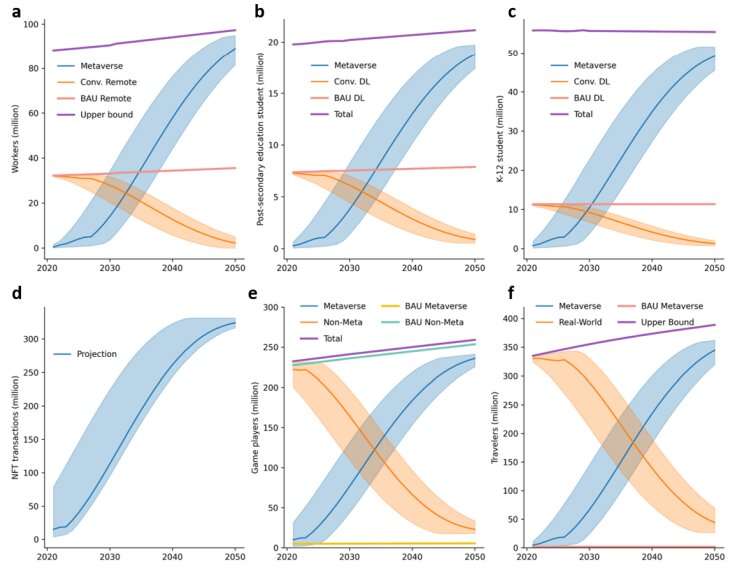
For many technology enthusiasts, the metaverse—a virtual 3D environment in which the physical and digital worlds converge—has the potential to transform almost every facet of human life, from work to education to entertainment.
New Cornell research shows the metaverse could have environmental benefits, too: lowering the global surface temperature by up to 0.02°C before the end of the century.
The team’s paper, “Growing Metaverse Sector Can Reduce Greenhouse Gas Emissions by 10 Gt CO2e in the United States by 2050,” published June 14 in Energy & Environmental Science. The lead author is doctoral student Ning Zhao.
“We try to understand, from the energy and climate perspectives, how this particular technology will be helpful,” said Fengqi You, the Roxanne E. and Michael J. Zak Professor in Energy Systems Engineering in Cornell Engineering and the paper’s senior author. “We’re basically trying to predict the future, so we have to use a very rigorous systems analytics approach to understand all the statistical significance, all the possible pathways, and decipher all the data and information that is out there to find out the impacts in energy, in climate, in environment and also in economics and technology.”
The team used AI-based modeling to analyze data from key sectors—technology, energy, environment and business—to anticipate the growth of metaverse usage and the impact of its most promising applications: remote work, virtual traveling, distance learning, gaming and non-fungible tokens.
The researchers projected metaverse expansion through 2050 along three different trajectories—slow, nominal and fast—and they looked to previous technologies, such as television, the internet and the iPhone, for insight into how quickly that adoption might occur. They also factored in the amount of energy that increasing usage would consume. The modeling suggested that within 30 years, the technology would be adopted by more than 90% of the population.
“One thing that did surprise us is that this metaverse is going to grow much quicker than what we expected,” You said. “Look at earlier technologies—TV, for instance. It took decades to be eventually adopted by everyone. Now we are really in an age of technology explosion. Think of our smartphones. They grew very fast.”
Currently, two of the biggest industry drivers of metaverse development are Meta (formerly Facebook, which believed in the technology so much it rebranded itself) and Microsoft, both of which contributed to the study. Meta has been focusing on individual experiences, such as gaming, while Microsoft specializes in business solutions, including remote conferencing and distance learning.
Limiting business travel would generate the largest environmental benefit, according to You.
“Think about the decarbonization of our transportation sector,” he said. “Electric vehicles work, but you can’t drive a car to London or Tokyo. Do I really have to fly to Singapore for a conference tomorrow? That will be an interesting decision-making point for some stakeholders to consider as we move forward with these technologies with human–machine interface in a 3D virtual world.”
The paper notes that by 2050 the metaverse industry could potentially lower greenhouse gas emissions by 10 gigatons; lower atmospheric carbon dioxide concentration by 4.0 parts per million; decrease effective radiative forcing by 0.035 watts per square meter; and lower total domestic energy consumption by 92 EJ, a reduction that surpasses the annual nationwide energy consumption of all end-use sectors in previous years.
These findings could help policymakers understand how metaverse industry growth can accelerate progress towards achieving net-zero emissions targets and spur more flexible decarbonization strategies. Metaverse-based remote working, distance learning and virtual tourism could be promoted to improve air quality. In addition to alleviating air pollutant emissions, the reduction of transportation and commercial energy usage could help transform the way energy is distributed, with more energy supply going towards the residential sector.
However, You notes, the metaverse can only do so much.
“This mechanism is going to help, but in the end, it is going to help lower the global surface temperature by up to 0.02 degrees,” he said. “There are so many sectors in this economy. You cannot count on the metaverse to do everything. But it could do a little bit if we leverage it in a reasonable way.”
More information:
Ning Zhao et al, The growing metaverse sector can reduce greenhouse gas emissions by 10 Gt CO2e in the United States by 2050, Energy & Environmental Science (2023). DOI: 10.1039/D3EE00081H
Citation:
Metaverse could put a dent in global warming, says study (2023, June 15)
retrieved 15 June 2023
from https://techxplore.com/news/2023-06-metaverse-dent-global.html
This document is subject to copyright. Apart from any fair dealing for the purpose of private study or research, no
part may be reproduced without the written permission. The content is provided for information purposes only.
Stay connected with us on social media platform for instant update click here to join our Twitter, & Facebook
We are now on Telegram. Click here to join our channel (@TechiUpdate) and stay updated with the latest Technology headlines.
For all the latest Technology News Click Here
For the latest news and updates, follow us on Google News.
